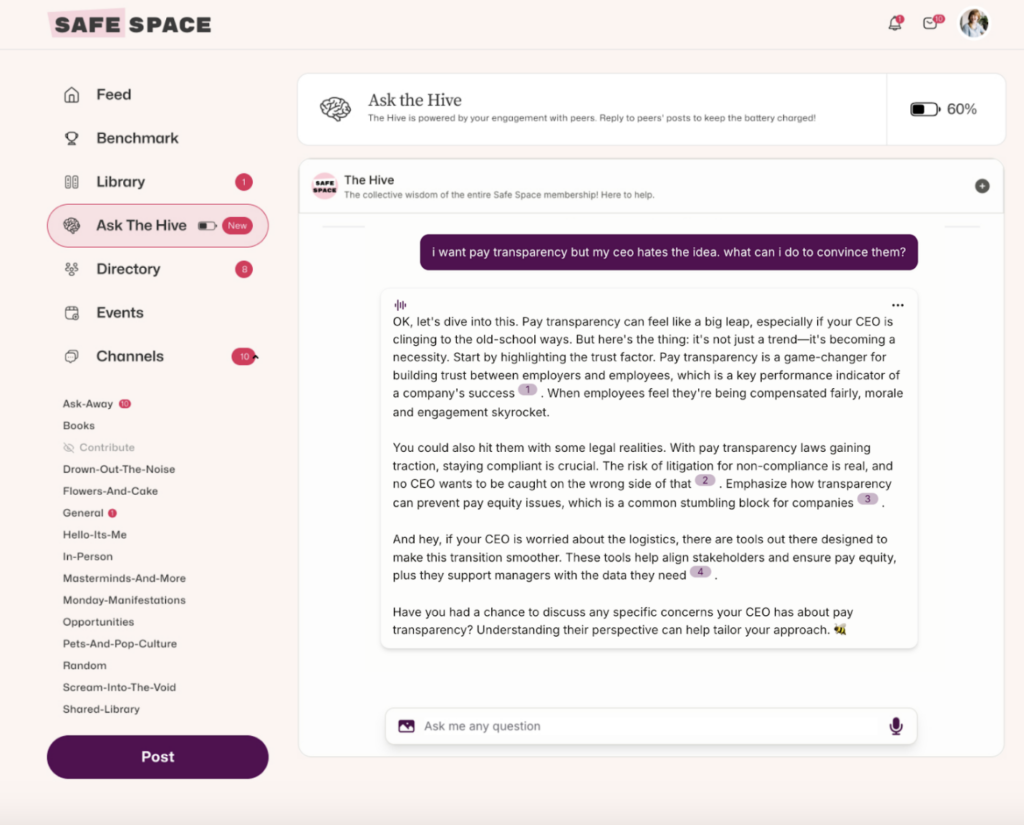
How do I tell my boss that I am not interested in obtaining a SHRM certification based on the information I’ve learned about them? I want to move up in HR but do not want to support an organization that is so far from the values I hold. Unfortunately, my company seems to only promote HR professionals with this certification.
RyanMae Pepin, Senior Director of People Ops at Blackthorn.io
Look into the PHR/SPHR or an alternative course/cohort like PeakHR! I think the PHR is likely to be the closest match, and is still a certification. (And I think it may be cheaper).
Rachel Ackerman, Director of People Operations at Barstool Sports:
Your performance should not be based on a test. Just like in school, many people do not test well. Can you have a deeper conversation asking why this is so important to them? Is it an org value that they like individuals to have certifications/learning or is this coming from one manager/leader who just has that preference. It’s honestly an antiquated approach to holding up upward mobility. Your role should be based on your job description and (in my humble opinion) unless you’re a doctor, lawyer, or other professional that requires additional schooling, these types of certifications should not be mandatory for promotion.
Additionally, will the company be covering the costs for the training and testing? It’s also a major time commitment. If they’re requiring this for advancement, are they compensating you for your time and/or allowing you to study during work hours?
Kristen Francisco, People and Purpose Consultant:
HRCI has been around longer and while their reputation years ago was that they were a little out of date, they’ve not been in the hot seat for any ethical dilemmas (that I know of!) I know there have been a lot of suggestions for other organizations – like Peak HR for example, but you might check out Hacking HR’s courses too (they’re not a nationally recognized certification, but they do offer challenging courses with course completion certificates and are inexpensive)
Here are key points to consider:
1. Recognition and Reputation:
- PHR: Older, established certification with a long-standing reputation in the HR field.
- SHRM-CP: Newer certification, but backed by SHRM’s strong industry presence and reputation.
2. Focus and Content:
- PHR: More focused on technical and operational aspects of HR.
- SHRM-CP: Emphasizes behavioral competencies and business strategy alongside technical knowledge.
3. Exam Structure:
- PHR: Traditional knowledge-based multiple-choice exam.
- SHRM-CP: Includes situational judgment questions in addition to knowledge-based items.
4. Recertification:
- PHR: Requires 60 recertification credits every 3 years.
- SHRM-CP: Requires 60 Professional Development Credits (PDCs) every 3 years.
5. Global Recognition:
- PHR: Well-recognized in the U.S., less so internationally.
- SHRM-CP: Growing international recognition due to SHRM’s global presence.
6. Career Level:
- PHR: Typically for HR professionals with 1-4 years of experience.
- SHRM-CP: Designed for HR professionals at any career stage, with a focus on those in operational roles.
7. Industry Preference:
JOIN 150K+ HR LEADERS
Get insights, learnings, and advice on how to build companies and cultures that people actually love.
No spam. Unsubscribe any time.
- PHR: May be preferred in more traditional industries or companies.
- SHRM-CP: Often favored in companies focusing on strategic HR.
8. Cost:
- Both have similar cost structures, but exact prices may vary.
9. Study Materials:
- Both offer comprehensive study materials, but SHRM’s might be more readily available due to the organization’s size.
10. Competency Model:
- PHR: Based on technical HR knowledge domains.
- SHRM-CP: Based on SHRM’s competency model, which includes both technical and behavioral competencies.

How do you suggest navigating the certification world going forward? I’ve currently been preparing to take the SHRM cert exam, unfortunately, and am now feeling defeated. Do you have any suggestions on how to earn these certs, or something just as good, from another org?
Alex Clermont, Director of People and Operations at TDC:
Highly recommend looking into the HRCI certifications instead.
AnnE Diemer, HR Consultant:
Krista Lane and I thoroughly documented our certification process with HRCI! Check it out here.
Kristen Francisco, People and Purpose Consultant:
This may be an unpopular opinion, but:
If you’ve already invested time and money in obtaining your SHRM certification (books, courses, exam fees), there’s no shame in following through. Your certification still demonstrates a commitment to professional growth and competency and remains a valuable accomplishment.
However, if you’ve only been focused on self-study and haven’t made any financial investment into the certification, considering a switch to HRCI might be the better path. While it’s important to vote with our dollars, we should never shame someone for completing something they’ve already significantly invested in.
Ultimately, both paths can lead to professional growth. The best choice depends on your individual circumstances and how far along you are in the process.


